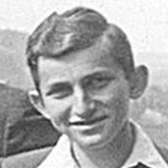
-
Learn More about Marcel
- Collections View Marcel's family papers
- Echoes of Memory Read Marcel's writings
- First Person Watch Marcel share his Holocaust experiences at a First Person program
- Oral History Listen to Marcel's Oral Testimony
- Podcast Hear Marcel discuss narrowly escaping an aktion in Drohobycz, Poland
As a boy, Marcel Drimer of Drohobycz, Poland, was continually on the move to avoid being discovered by the Nazis. He and his family hid in a field, under wood in a lumber yard, in a hole in a mattress, and in an attic so small that even a child could not stretch his limbs. His survival was helped by his former nanny, a policeman bribed with family jewelry, a doctor, a Ukrainian/Polish family, and even a German soldier.
Marcel Drimer was born Marceli Drimmer on May 1, 1934 in Drohobycz, Poland (today Drohobych, Ukraine). His father, Jacob, worked as an accountant in a lumber factory while his mother, Laura (Gruber), took care of Marcel and his younger sister, Irena. The family spoke Polish at home. His parents also spoke Yiddish.
When Germany and the Soviet Union invaded Poland in September 1939, the town of Drohobycz fell under Soviet control in accordance with the German-Soviet Pact. While Jews were not singled out during this period, Drohobycz was changed into a Soviet town and Soviets deported those whom they deemed enemies of the state to Siberia.
On June 22, 1941, Germany violated the German-Soviet Pact, attacked the Soviet Union, and invaded eastern Poland. In just over a week, German forces occupied Drohobycz. On the first day of the occupation, Ukrainian auxiliary forces looted Marcel’s grandparents’ home. In the process, Marcel’s grandfather was severely beaten and died days later from his injuries. The Germans imposed numerous restrictions on Jews. The occupiers also confiscated Jewish-owned property and forced Jews to wear armbands with Stars of David.
Living conditions for Jews under the occupation quickly became very difficult. Marcel’s non-Jewish nanny, Jancia frequently visited the family to bring them food and often took Marcel for days at a time to bathe and feed him. During one visit to Jancia’s, a roundup or Aktion, took place. To avoid capture, Marcel, Laura, and Irena hid amongst the wheat fields for the better part of a day. While hiding, they could hear the screams of Jews being taken away. During this specific Aktion in August 1942, much of Marcel’s extended family was taken to Belzec killing center where they were gassed upon arrival. His father survived the roundup because his work permit provided him with an exemption.
In October 1942, Marcel and his family were forced into the Drohobycz ghetto, where they lived in one room with little food. Jacob was able to continue working outside of the ghetto at the lumber factory, which provided an opportunity for him to barter for food. He was escorted to and from under armed guard each day. During roundups, Marcel and his family hid in secret bunkers in hopes of escaping deportation. Before the liquidation of the ghetto, Jacob was able to bribe the guard who escorted him to work and the family escaped the ghetto. They hid for a time in the attic of the lumber factory before threats of denunciation forced them to look for another hiding place.
In fall 1943, a Ukrainian/Polish family, the Sawinskis, agreed to hide Marcel, Laura, and Irena. Eventually, Jacob, and other Jews joined them. To avoid deportation, the Drimmers hid in various locations on the Sawinki’s property, including a tiny attic space, a stable, and even an underground hole. Their movement was incredibly limited while in hiding. Capture by the Nazis would mean death for not only Marcel and his family but also for the family hiding them. In August of 1944, the Soviet Army reconquered Drohobycz and liberated Marcel and his family. Due to the hunger and physical deprivation of his time in hiding, Marcel’s legs would no longer support his body and he relearned how to walk.
During the fall of 1945, Marcel and his family moved to Wałbrzych, where he finished high school, and he later graduated from engineering college in Wrocław. In 1961, Marcel moved to the United States, where he was joined by and married his wife, Ania, who was born in the Soviet Union, where her Polish-Jewish parents had been deported by the Soviets during the war. The Sawinski family has been named Righteous Among the Nations by Yad Vashem, Israel’s Holocaust memorial. Both Marcel and Ania are volunteers at the United States Holocaust Memorial Museum.




